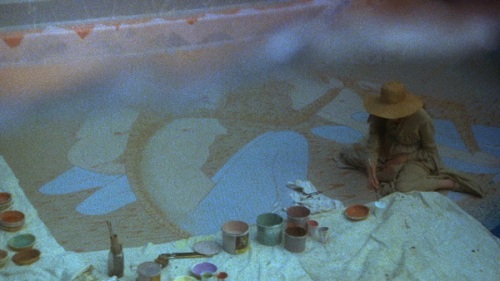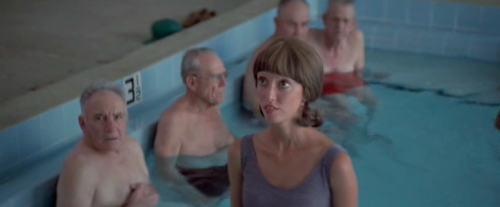As a film student at the University of Southern California, new to LA and without connections, Patricia Resnick had a habit of following film trucks, just to see where they’d lead. One took her to Westwood and the set of California Split (1974). The director was Robert Altman, her favorite. That afternoon, she hovered around the trucks (“I had more guts than brains,” she says), and when Altman turned up, Resnick told him she wanted to interview him for a paper she was writing on the greatest living director—which was true. He said okay. The next day, Altman called and said he wanted to hire her, not then but later. By the time Resnick graduated in 1975, he had a job for her: assistant to the publicist on Buffalo Bill and the Indians (1976). It was while they were working on that film that he asked if she wanted to write a treatment for the idea that became 1977’s 3 Women.

There’s a rule in the films of Robert Altman: if something works, turn it around and look again. A good Altman picture turns its people and places around so many times, it feels less like a single movie than x number of movies, one for every turn. And with every turn, more flavor. Dreamy and satirical and alarming, 3 Women is a Persona-like slow roast skewered on a spit, a picture of Altman’s frightened unconscious if it woke up in, well, Dodge City. Resnick, whose career as a Hollywood screenwriter was launched that day on the California Split set, would go on to collaborate with Altman on A Wedding (1978) and Quintet (1979) and appear briefly in The Player (1992). Here, she discusses her work with the filmmaker and his translation of 3 Women from brain to screen.
Sam Wasson: So you’re working on Buffalo Bill—
Patricia Resnick: Here’s what happened. He was producing Bob Benton’s movie The Late Show. Lily Tomlin was in it, and she was improving a lot of her dialogue, and she was asking for suggestions. And I was there and threw out some suggestions she liked. She eventually asked me to write a couple pieces for what became her first Broadway show. Altman went to see the show and said, “Oh, the kid can write.”
SW: It was around this time—as Altman told it—that his wife, Kathryn, got sick and he had this dream, a sort of nightmare.
PR: The dream was mostly cast and setting, more than it was story. Sissy and Shelley were in the dream. And he had the desert and something about switching personas. Those things were there, but they were vague. It was a dream.
SW: And he takes the dream to Fox?
PR: Yes. He had a good relationship with Fox and told them about this dream, and they said, “Great, but we’re not going to finance this dream without seeing something on paper.” So Altman came to me and said he wanted a treatment written, and if Fox moved forward with the film and wanted a script, I could come on as screenwriter and that would be my first screenwriting credit.
SW: Beyond the dream elements, was Altman specific about wanting anything else in the treatment?
PR: No. He just wanted a treatment, about fifty pages. We knew there had to be something of a story and we knew there had to be a third woman.
SW: Why?
PR: He just wanted a third woman. He liked the title 3 Women, so we needed a third woman. That was Bob.

SW: Did he let you go from there or did he work closely with you on the treatment?
PR: At the time, I was sharing an office with Scotty Bushnell, who was his right-hand person, who was casting all the time, so all these actors were running in and out. Ed Ruscha was around a lot, and various other sundry people. I was upstairs and Altman was downstairs, and he would come up all the time and we would go over everything, about every ten pages or so. But mostly he just let me go. It wasn’t like most writing—a collaboration between left brain and right brain. With this, I tried to use my left brain very little—I tried to dream it also.
SW: How did he give notes on a piece of unconscious writing based on a dream?
PR: He wasn’t a real note giver. I don’t think I ever got a written note from him on anything ever. Generally, conversations would be more about what he was seeing. I’d show him pages, and he’d say, “Okay, good, but I really want a run-down bar with all this crap out in the back, with shit piled up. I want that.” That was an Altman note. You know what I mean? He wasn’t a reader. Trying to get him to read a book or script was impossible. I wondered in later years if he might have been dyslexic, not seriously, but he was that averse to the printed word. His process was completely anti-intellectual. I remember at one point there was a film he wanted to make, a film based on a book, not a particularly good one, and it was set in a factory. He liked the idea, visually, of the factory—and that did it. He went from there to try to make a movie around it, but it didn’t go forward. That’s sort of how we worked on 3 Women. He’d like something and in it went.
SW: How long did the treatment take you?
PR: About a month. I wrote it quickly. When I finished, he was very happy with it, and he went to Fox, which decided to go ahead with it. And then a couple weeks later, he called me into his office and said, “I’m really sorry, but I’ve decided not to do a screenplay. I’m going to have the actors do it. But I’ll have you work on the movie in some way, as an extra or PA or something.” He knew I needed some kind of job. I was only twenty-two, twenty-three, and without any other prospect. So I was pretty devastated. Altman was the only Hollywood connection I had.
Continue reading at Criterion

